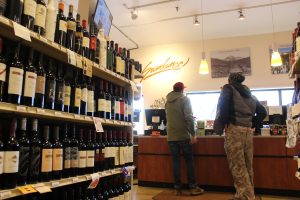Colorado lawmakers send Polis bill to limit expansion of alcohol sales in grocery stores in effort to aid independent sellers
The bill is opposed by grocery and box store chains but hailed by independent businesses and craft producers as a lifeline

Aspen Times File photo
A bill that would stop Colorado grocery stores from getting new licenses to sell hard alcohol is headed to the governor’s desk.
Senate Bill 33 passed the House on Monday in a 55-8 vote after being approved in the Senate in February by a vote of 28-5. It represents the legislature’s second attempt to safeguard independent liquor stores following the passage of a 2022 ballot measure that allowed grocers to begin carrying wine.
A more sprawling initiative last legislative session that would have limited the sale of hard alcohol to just liquor retailers and established new restrictions on how grocers sell wine and beer failed. This year’s proposal wouldn’t change beer or wine sales in grocery stores, but it would prevent these retailers from obtaining new hard liquor licenses.
Sen. Dylan Roberts, D-Frisco, one of the bill sponsors, called it a “carefully crafted, narrowly focused bill” that will help independent sellers stay afloat. He also framed the measure as a public safety initiative, saying that the availability of hard liquor in grocery stores can be harmful to those struggling with substance use disorders.
A spokesperson for Gov. Jared Polis declined to say whether he would sign it into law, stating that he would “review the final version of this bill when it reaches his desk.”
For Chris Carran, owner of Locals Liquors in Silverthorne and board member for Colorado Independent Liquor Stores United, the bill “is all about saving small business and the craft beverage industry.”
She hopes the measure’s broad bipartisan support from lawmakers will garner approval from Polis.
Carran, a leading voice against the push to introduce wine into grocery stores, has repeatedly called attention to the disadvantages independent stores face compared to corporate chains, which are able to negotiate lower prices through bulk orders. She added that small businesses are often where local brewers, winemakers and distillers stock their products.
Mountain town liquor store owners, including Carran, have reported declining sales in the months since grocers began carrying wine following the 2022 ballot initiative, which was largely opposed by Western Slope voters.
Even before that, store owners faced challenges with the introduction of full-strength beer in grocery and convenience stores in 2016, which is also when the state first began issuing licenses for spirits to grocers.
Currently, around two dozen grocery stores in Colorado hold a liquor license, including the Western Slope’s sole Costco, located in Gypsum, which began selling hard alcohol in 2018. Stores with existing licenses would be able to continue selling under the bill.
While liquor stores will likely continue feeling the impact of beer and wine sales in grocery stores, halting the expansion of liquor at these retailers will help “stop the bleeding,” Carran said.
“By doing this, we have the ability for liquor stores to at least dive in on a business plan without the fear of grocery stores doing to us with liquor what they did with wine,” she said. “It’s a lifesaver right now, and we have to work on making our businesses a little bit more solid.”
Senate Bill 33 was opposed by grocery and box store chains, including Target, companies owned by Albertsons and Kroger, as well as trade groups like the Distilled Spirits Council of the United States.
In a February hearing before the Senate Business, Labor and Technology Committee, the trade group’s vice president of public affairs and state policy, Ainsley Giglierano, called the bill a reintroduction of “Prohibition-era laws to restrict the sale of spirits.”










